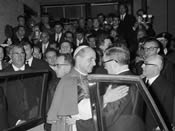The season of Lent is supposed to be one in which we intensify our struggle for sanctification, in accordance with the will of God: Haec est voluntas Dei, sanctificatio vestra, “This is the will of God, your sanctification. (1 Thes 4:3). This is also the Will of God at its most encompassing, at least from our standpoint. It is our highest “vocation”.
“Vocation” comes from the Latin, vocare, “to call”, related to voca, for “mouth”, and vox, for “voice”. The word is used, generally, in reference to God’s calling us to make those decisions or choices that have a radical, lifelong, or better, eternal, impact on our existence.
All men are called to holiness (sanctity), meaning, “union with God”—to live morally upright lives, to acquire all the virtues, to be perfect (Mt 5:48), which is possible because of God’s grace—and so to share in His eternal happiness (beatitude). This is the doctrine of the “universal call to holiness” which can be considered the “centerpiece” of the teachings of the Second Vatican Council. It is also the doctrine preached by St. Josemaria since 1928, when (and for which) he founded Opus Dei. An important corollary of this message is that, for the vast majority of ordinary people living in the middle of the world, the path to sanctity lies in the fulfillment of one’s ordinary duties, in the home, at work, in social life, by doing them well and out of love for God; that is, with human and supernatural perfection.
The call to holiness becomes more and more specific as one narrows the field: in the case of catholics, one could be part of the “clergy”, or of an order of “religious”, or of the “laity” (those who are neither clergy nor religious). In the case of lay people, which many of us are, the path to holiness consists in “engaging in temporal realities and ordering them according to God’s plan” (Lumen Gentium, No. 31). Many lay people are “called” to the “married state”, while some are not. Marriage is also a vocation. Our professional work is also a “vocation” not only in a general sense but also regarding one’s particular job, to the extent that it may involve a radical, life-determining choice.
Sanctification also means growing in the supernatural virtue of charity—loving God above all else for His own sake and our neighbor as ourself for love of God—which, in turn, translates into loving the will of God.
Loving the will of God consists, actively, in fulfilling “the duty of each moment” (The Way, No. 815) and, passively, in “abandonment”: “The wholehearted acceptance of the will of God is the sure way of finding joy and peace: happiness in the cross. It’s then we realize that Christ’s yoke is sweet and his burden is not heavy” (The Way, No. 758). “’Gaudium cum pace’—‘joy with peace’—the unfailing and savory fruit of abandonment" (The Way, No. 768).
Perhaps, since we are all really very little, we shall be called to passive abandonment more often than to the bustle of activity. Indeed, God does not ask much from each of us (just everything we have); and that is why the Decalogue is couched, for the most part, in “negative” terms (“thou shalt not”): the minimum of doing good is not doing wrong. Still, avoiding evil and doing good, passive abandonment and active involvement in God’s plans, both call up “deeds” (the action of our free will) without which there is no love. “There is a story of a soul who, on saying to our Lord in prayer, 'Jesus, I love you’, heard this reply from heaven: ‘Deeds are love—not sweet words.’” (The Way, No. 933). Our Lord Himself said: “If you love me, you will keep my commandments.” (Jn 14:15). “Not everyone who says to me, ‘Lord, Lord,’ will enter the kingdom of heaven, but only the one who does the will of my Father in heaven.” (Mt 7:21).
We should be sensitive and docile to the Will of God. Like
Mary’s fiat is the most momentous “yes” of a creature to the Will of God: the Redemption depended on it. And when Mary figured out that God wanted her to visit and assist her cousin Elizabeth—several days’ journey away—who was about to give birth, the Blessed Virgin went cum festinatione, “with haste” (Lk 1:39).
Most important, the Redemption was accomplished through the obedience of the God-man—Christ was “obedient to death, even to death on a cross” (Phil 2:8)—to the Will of the Father: “For just as by the disobedience of the one man (Adam) the many were constituted sinners, so also by the obedience of the one (Christ) the many will be constituted just” (Rom 5:19).
St. Josemaria writes: “Many great things depend—don’t forget it—on whether you and I live our lives as God wants.” (The Way, No. 755)
O.C.P.A.J.P.M.








